Impaired Fasting Glucose: How to Care for Your Child
To check someone for impaired fasting glucose, health care providers do a blood test after the person didn't eat for at least 8 hours (fasted). If the test results show a high glucose level, the person is diagnosed with impaired fasting glucose. This means that their body isn't handling glucose as it should, increasing their risk for developing type 2 diabetes. By getting more physical activity and eating a healthy diet, most people can lower their risk.


-
If your health care provider gave your child a plan to get to a healthy weight, help them follow it.
-
Serve whole grains, vegetables, and other fiber-rich foods.
-
Limit the amount of junk foods and sugary drinks in your child's diet.
-
Encourage your child to be active. They should aim for at least an hour of physical activity every day. It can be done all at once or spread out over the day. If an hour seems like a lot, they can start small and work up to it.
-
Be sure to go to all follow-up care visits so the health care provider can check your child for diabetes.

Your child:
-
has symptoms that might point to diabetes, such as:
-
needs help maintaining a healthy diet and getting enough activity. Your health care provider could recommend a dietitian or other specialist who can help.

Your child:
-
develops unexplained stomach pain, nausea, or vomiting
-
has deep, fast breathing
-
is extremely drowsy or confused, or becomes unconscious (passes out)

What is glucose? Glucose (a type of sugar) is the body's major source of energy. Our bodies break down food into glucose and other nutrients, which are then absorbed into the bloodstream from the gastrointestinal tract. A hormone called insulin works to let glucose into cells.
What happens to cause impaired fasting glucose? In kids with impaired fasting glucose, insulin starts losing its ability to let glucose into the cells. Glucose still gets into the cells, but not as well as it should. This leads to a higher level of glucose in the blood than is normal.
Does having impaired fasting glucose mean diabetes? No. Fasting glucose levels of 100–125 mg/dL indicate impaired fasting glucose. Fasting glucose over 125 could indicate diabetes. By getting to a healthy weight, eating a balanced diet, and getting regular physical activity, most kids with impaired fasting glucose can avoid getting diabetes.